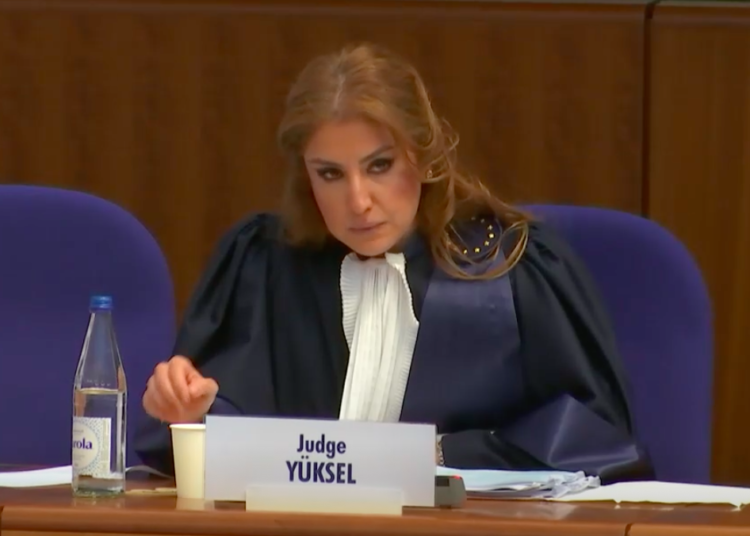Levent Kenez/Stockholm
Turkey’s judge serving at the European Court of Human Rights (ECtHR) continues to advocate for the Turkish government’s positions. Deviating from the opinions of other judges in cases concerning Turkey, Judge Saadet Yüksel has consistently supported the rulings of Turkish courts, most recently being the sole member among seven judges to endorse the Turkish government’s position in a case involving violations of a journalist’s rights.
The ECtHR on Tuesday ruled that the right to liberty and security as well as the right to freedom of expression of Ayşenur Parıldak, a court reporter for the former Zaman daily, shut down by the government in 2016, who was detained after a controversial coup attempt on July 15, 2016, were violated by Turkey. The Turkish government was ordered to compensate Parıldak in the amount of 22,000 euros.

The ECtHR also ruled that Parıldak had been unlawfully detained since there were no reasonable legal grounds to suspect her of membership in a terrorist organization. Laws were unreasonably interpreted and applied during her detention, constituting a violation of her rights. The Strasbourg court in its ruling found that Parıldak’s detention infringed on the rights to liberty and security of person as enshrined in Article 5 of the European Convention on Human Rights (ECHR) as well as freedom of expression as set forth in Article 10, stating that her arrest was unjustified. The court emphasized that there was no reasonable suspicion for the journalist’s arrest under Article 5 and that the initial period of detention was unreasonably long.
Turkish judge Yüksel diverged from the other members by casting a dissenting vote against all the ECHR articles deemed to have been violated. Additionally, Yüksel, who appended a brief dissenting opinion to the court’s decision, reiterated that she was maintaining her position from past cases.
It is not the first time that Yüksel has stood apart from the majority in human rights cases involving Turkey and siding with the Turkish government. For instance, in a groundbreaking decision with potentially widespread implications, the Grand Chamber of the ECtHR ruled in September 2023 that the conviction of Yüksel Yalçınkaya, a teacher in Turkey, on terrorism charges, including the use of a mobile phone app and having an account at a specific bank, was unlawful. The verdict may have significant consequences for numerous individuals facing similar charges in Turkey. However, Yüksel’s position in the Yalçınkaya case is noteworthy. Yüksel, the sole judge among 17, argued that Article 6, guaranteeing a fair trial, had not been violated and voted in favor of Turkey.
During the proceedings Yüksel aligned herself with the government’s stance on the ByLock encrypted messaging app. Yalçınkaya’s lawyers argued the illegality of the acquisition of ByLock data. Yüksel’s questioning of expert findings raised concerns about her impartiality in a case marked by allegations of an unfair trial and questionable evidence. Yüksel defended the Turkish government’s position, asserting that merely downloading a messaging app constitutes membership in a terrorist organization rather than siding with the majority opinion, which deemed the use of such an application to be insufficient evidence for terrorism charges.
Nordic Monitor previously reviewed cases where Yüksel dissented from the majority opinion in which the applicants were critics of Turkish President Recep Tayyip Erdogan, taking a clear stance in line with local Turkish courts. Among these applicants were Selahattin Demirtaş, the former co-chairman of a pro-Kurdish opposition party, businessman Osman Kavala and journalists Kadri Gürsel and Ahmet Şık.
Expressing dissenting or partly concurring opinions on almost every decision, Yüksel refers to the politicized Turkish courts, even in cases where she is in agreement with the majority decision or in those in which she makes the same decision as the majority but argues that there is a lack of communication between the Turkish judiciary and the ECtHR. In applications made after a coup attempt in 2016, which led to a proliferation of major human rights violations in Turkey, she takes a position in favor of the Erdogan government.

Following Yüksel’s appointment to the European court, human rights observers expressed concern about her impartiality given the close ties between her and Turkey’s ruling Justice and Development Party (AKP). Not only was her brother Cüneyt an AKP lawmaker, but Yüksel herself was affiliated with Islamist foundations supported by the Erdogan government. She was also an assistant to and student of the late Burhan Kuzu, a chief aide and leading propagandist of President Erdogan. Nordic Monitor previously published a report on Yüksel’s strong ties to the government.
Yüksel and former ECtHR President Róbert Ragnar Spanó were at the center of harsh criticism in September 2020. Spanó was the first ECtHR president to pay an official visit to Turkey, the government of which is a party to more than 16 percent of the cases before the Strasbourg court. Spanó and Yüksel met with President Erdogan behind closed doors at his presidential palace.
The court decision on Parıldak, available only in French:












